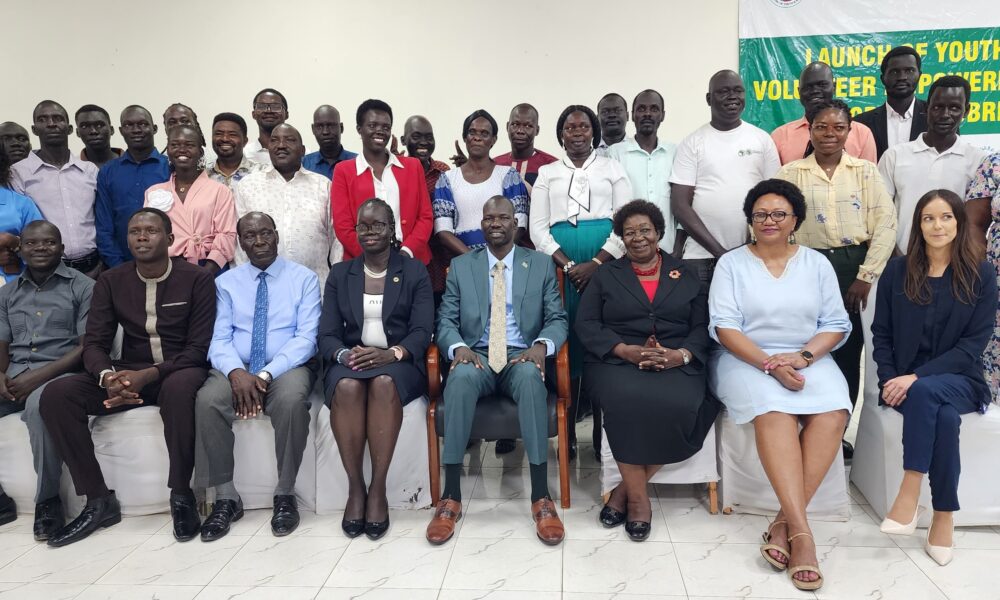By Philip Buda Ladu
The government, in partnership with Impact Health Organization has unveiled Youth Volunteer Empowerment Programme.
A landmark initiative, dubbed “KUBRI”, meaning “bridge”, launched on Tuesday is implemented with technical support from UNFPA.
National Ministry of Youth and Sports spearheads implementation of the program aimed at transforming the prospects of unemployed graduates and harnessing the nation’s vast youth potential.
The program, launched at Grand Hotel in Juba, promises to be a vital link between academic learning and professional earning, addressing the critical challenge of youth unemployment in the youngest East African nation.
In a keynote remarks, Sarah Masale, Deputy Country Representative, UNFPA South Sudan, emphasized the urgency of the programme.
“South Sudan is a young nation in every sense. Seven out of ten of our fellow citizens are under thirty. Yet too many of our graduates leave campus to find only closed doors,” she stated. KUBRI, she explained, is the nation’s response, a “bridge from learning to earning, from study to service.”
With National Youth-Led Organization, Impact Health Organization (IHO), KUBRI will place qualified, unemployed graduates in six-month volunteer assignments within government ministries, commissions, and essential public institutions.
Ms. Masale highlighted the transformative power of volunteering saying: “Service builds skills that classrooms cannot. Discipline, teamwork, ethical leadership, and community trust.”
She cited evidence from similar schemes showing that volunteers are far more likely to secure full-time work within a year of placement.
The program is designed to be inclusive, welcoming young women, young men, persons with disabilities, and graduates living with HIV.
Volunteers will receive comprehensive orientation, invaluable mentorship, a modest stipend, and transport support to ensure economic status does not hinder participation.
Hon. Joseph Geng Akech, National Minister of Youth and Sports, underscored the immense, yet often untapped, potential of South Sudanese youth.
He recalled about their pivotal role in the nation’s first liberation war and their recent triumph in leading African basketball globally.
“The young people are the backbone, evidently, of this country, in terms of talent, in terms of resilience, in terms of hard work,” Minister Akech affirmed. He called for a “second liberation,” one focused on economic prosperity through education, hard work, wealth creation, and “building bridges” for peace.
The Youth Minister also offered demonstrative advice to the prospective volunteers, urging them to embrace a mindset of humility, continuous learning, and resilience in the face of workplace challenges.
“You do not grow if you are fighting everyone. You grow if you are building bridges,” he counselled, drawing a direct parallel to the program’s name, KUBRI.
Akech further expressed a vision for the program’s expansion beyond the pilot phase, hoping to see it extended to all states and eventually incorporating a strong focus on entrepreneurship.
The Undersecretary in the Ministry of Public Service and Human Resources Development reinforced the critical role of youth in national development, describing them as “the future leaders, innovators and change makers who shape the destiny of their country.”
Acknowledging the myriad challenges faced by young people, including rampant unemployment and limited access to resources, the Undersecretary applauded the KUBRI initiative as a vital step towards addressing these issues.
“This program will help the government in addressing some of the problems of rampant unemployment and if well implemented it will improve the situation in our country,” she stated, expressing optimism that KUBRI would create an enabling environment for active youth participation in the nation’s development.
The stakeholders and dignitaries at the launch event issued a powerful call for collective action.
UNFPA’s Masale urged the government to open departments and budget for supervision, the private sector to view volunteers as a talent pipeline, and development partners to align resources.
Minister Akech echoed this, stressing that KUBRI’s success hinges on the full embrace of the program by all stakeholders, including government, private sector, NGOs, and UN agencies.
As the program sets sail, KUBRI stands as a symbol of hope and a concrete commitment to empowering South Sudan’s vibrant youth, proving that, as Ms. Masale concluded, “empowered youth are the most reliable engine of Sustainable development, peace and prosperity.”

